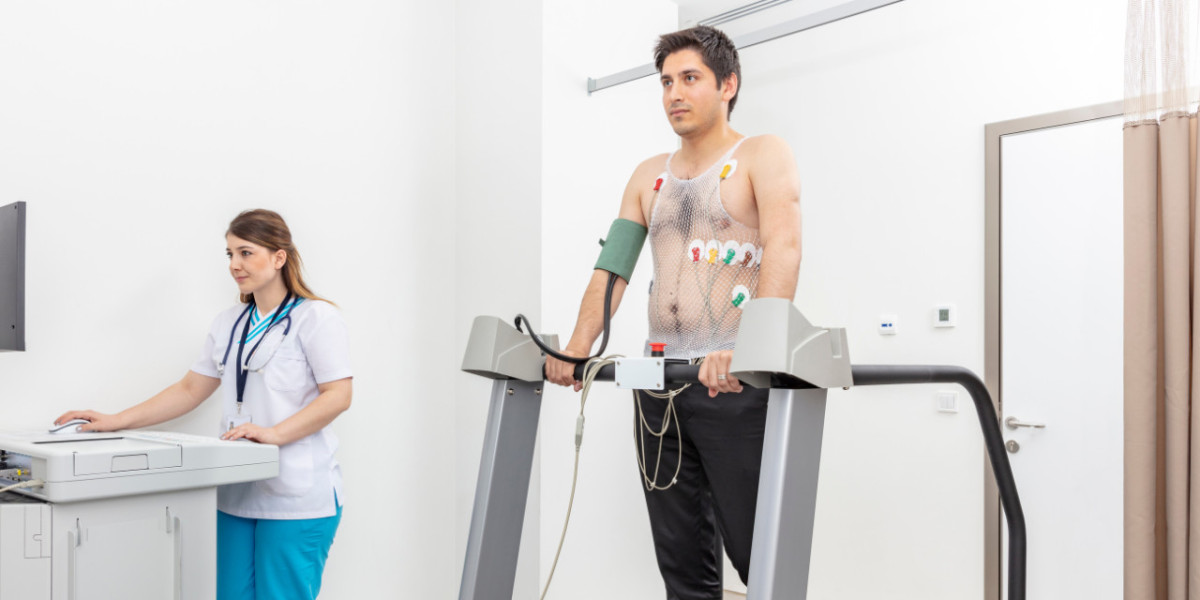Treadmill Test Near Me: A Complete Guide to Understanding Stress Tests
Are you wondering about the importance of a treadmill stress test and how it can benefit your health? If you're searching for the treadmill test near me, you're likely looking to ensure your heart health is in optimal condition. For those in Bangalore, check out to find trusted diagnostic services.
Understanding the Treadmill Stress Test
What Is a Treadmill Stress Test?
A treadmill stress test, also known as an exercise stress test, evaluates how your heart functions during physical activity. It is a non-invasive diagnostic tool used to:
Detect coronary artery disease (CAD)
Assess overall heart health
Monitor the effectiveness of treatments
This test requires you to walk or jog on a treadmill while your heart activity is monitored through an electrocardiogram (ECG).
Why Is It Important?
Your heart works harder during exercise, making it easier to identify irregularities in heart function. The treadmill stress test can:
Help identify symptoms like chest pain or shortness of breath
Predict risks of heart attacks
Evaluate blood flow to the heart
Who Should Consider a Treadmill Stress Test?
This test is recommended for individuals who:
Experience symptoms like fatigue, chest discomfort, or irregular heartbeat
Have a family history of heart disease
Are undergoing treatment for cardiac issues
How Does the Treadmill Stress Test Work?
Preparation for the Test
To ensure accurate results, follow these preparation tips:
Avoid eating or drinking caffeinated beverages at least four hours before the test.
Wear comfortable clothing and shoes suitable for exercise.
Inform your doctor about medications you're taking, as some might affect the results.
During the Test
Electrodes will be attached to your chest to monitor heart activity.
You will walk or jog on a treadmill with gradually increasing speed and incline.
The healthcare professional will monitor your heart rate, breathing, and blood pressure.
Post-Test Analysis
After the test, your doctor will analyze the results to:
Assess heart rhythm
Determine if there’s adequate blood flow during physical exertion
Identify any abnormalities
Benefits of a Treadmill Stress Test
Early Detection of Heart Issues
The treadmill stress test is one of the most effective ways to identify potential heart problems before they become severe. Early detection leads to timely treatment, reducing risks of complications.
Non-Invasive and Safe
Unlike other diagnostic procedures, this test doesn’t involve surgery or radiation. It’s a safe option for individuals across all age groups.
Monitor Treatment Progress
If you’re undergoing treatment for a heart condition, this test helps evaluate its effectiveness and guides further decisions.
How to Find the Best Diagnostic Center
Criteria for Choosing a Center
When looking for a center offering treadmill stress tests, consider the following:
Reputation: Look for reviews and ratings.
Qualified Staff: Ensure the center employs certified professionals.
Equipment: Modern, well-maintained equipment ensures accurate results.
For those in Bangalore, treadmill test near me connects you with a trusted diagnostic center offering exceptional services.
Cost and Insurance Coverage
The cost of a treadmill stress test varies depending on the location and facility. Many diagnostic centers accept insurance, so verify coverage beforehand.
Common Myths About Treadmill Stress Tests
Myth 1: It’s Only for Older Adults
Heart issues can affect individuals of all ages. This test is valuable for anyone with risk factors or symptoms of heart disease.
Myth 2: It’s Painful
The test is non-invasive and typically causes no discomfort, apart from the physical exertion similar to moderate exercise.
Myth 3: Results Are Always Accurate
While the treadmill stress test is highly reliable, additional tests may be required for a comprehensive diagnosis.
Maintaining Heart Health
Tips for a Healthy Heart
Exercise Regularly: Aim for at least 30 minutes of moderate activity daily.
Balanced Diet: Include heart-healthy foods like fruits, vegetables, and whole grains.
Avoid Smoking: Smoking significantly increases the risk of heart disease.
Regular Checkups: Periodic health screenings help identify issues early.
When to See a Doctor
Consult a doctor if you experience:
Persistent chest pain
Dizziness or fainting
Unexplained fatigue
Conclusion
If you're proactive about maintaining heart health, a treadmill stress test can be an invaluable tool. It provides insights into your heart's functioning, helping you take necessary preventive or corrective actions. For residents in Bangalore, visit treadmill test near me to schedule your test with a trusted diagnostic center.
FAQs About Treadmill Stress Tests
1. What is the purpose of a treadmill stress test?
The purpose is to evaluate how your heart performs under physical stress, detect abnormalities, and guide treatment plans.
2. How long does the test take?
The test typically takes 30-60 minutes, including preparation and post-test monitoring.
3. Are there any risks associated with the test?
The test is generally safe. Rarely, it may cause dizziness, irregular heartbeat, or chest discomfort, which are monitored by professionals.
4. Can I eat before the test?
It’s recommended to avoid eating heavy meals or drinking caffeinated beverages at least four hours prior.
5. Is the test suitable for everyone?
While generally safe, it may not be suitable for individuals with severe heart conditions or physical limitations. Consult your doctor first.
6. What should I wear for the test?
Wear loose, comfortable clothing and athletic shoes to facilitate ease of movement during the test.
7. How are the results interpreted?
Your doctor will analyze ECG readings, blood pressure, and symptoms to identify any abnormalities in heart function.
8. How often should I take a treadmill stress test?
Frequency depends on your health condition and doctor’s recommendations. It may be part of regular checkups for high-risk individuals.
9. What happens if the test shows abnormal results?
Abnormal results may lead to further testing, like an echocardiogram or angiography, for a detailed evaluation.
10. Can I resume normal activities after the test?
Yes, most people can resume normal activities immediately unless advised otherwise by their doctor.





